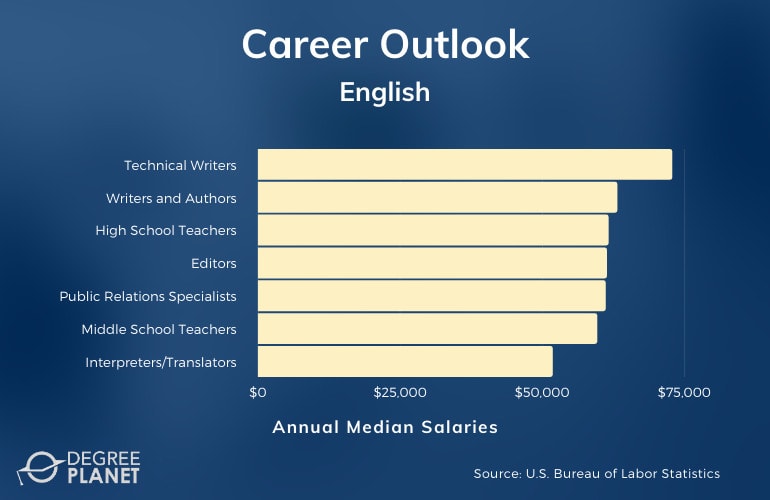Is an English degree worth it? English majors are often strong communicators and insightful critical thinkers who can find work in a variety of different fields.

Editorial Listing ShortCode:
Whether you want to be a writer, a teacher or a business professional, studying English can help get your career off to a successful start.
Is an English Degree Worth It?

Yes, an English degree is worth it for many students. The Bureau of Labor Statistics is projecting 4% job growth in media and communication occupations over the next 10 years. Common English careers in this field include writer, editor, reporter, high school teacher, and public relations specialist.
English is a versatile field of study because have a variety of areas you can work in and things you can do. Any industry that relies on clear communication may be able to put your services to good use.
In an English degree program, you’ll likely study the works of master writers, which can serve as a model to inspire your own writing abilities. Studying grammar, enrolling in writing workshops, and critiquing others’ work, can help you learn the best ways to clearly and effectively convey your thoughts. That is a skill that readily transfers to the workplace.
Many businesses rely on employees who can prepare concise yet meaningful communications for internal or external use. Public relations, media relations, and advertising are fields to consider.
Nonprofit organizations might benefit from your English skills as well. You might be a strong candidate for grant writing or fundraising positions, for example.
Editorial Listing ShortCode:
Publishing is another field that might appeal to you as an English major. You could pursue a career as a professional writer. That might include writing freelance pieces, newspaper articles, children’s stories, textbooks or novels. You might also work behind the scenes as an editor or a publishing executive.
The television and film industries rely on writers as well. Crafting a strong script requires writers, editors, and development managers. News stations need reporters and announcers.
You may want to pass your love of English on to future generations. With the right credentials, you could use your English degree for a teaching career. Middle schools and high schools often hire English teachers to teach literature, composition and grammar. For college level careers, you may be required to have a higher level degree such as an online masters in English.
A campus-based or online English degree can offer a strong foundation for graduate studies. From this bachelor’s program, you might find success in law school, medical school, an MBA program, or a library science program.
How to Decide Whether an English Degree is Right for You

English degrees often have the reputation of being “useless” degrees. That’s a far cry from the truth.
Even still, it’s smart to develop a clear understanding of why you’re pursuing this degree. Not only can it help you have a ready response for your critics, but it can also help you keep your eyes on the goal.
1. You love words and communication.

You’re likely going to spend a great deal of time reading and writing if you become an English major. That will probably be a lot more enjoyable if you’re a person who loves words.
During your bachelor’s program, you’ll likely read written works from around the world. This exploration can help you become a more cultured individual who better understands people and society.
You’ll probably try your hand at many different types of writing as well. Whether you want to be a poet or a paralegal, practicing under the tutelage of experienced writing faculty can serve you well in your career.
2. You want to develop your critical thinking skills.

During your English program, you may study works that don’t make a lot of sense on the first readthrough. In time, though, your studies can help you learn to draw meaning from complicated texts and then critically evaluate them. This process can also help you learn to dig deep and analyze situations from all sides.
Critical thinking is a valuable workplace skill, and most employers appreciate the ability to evaluate issues, consider creative solutions and build evidence-based arguments to support ideas.
3. You’re looking for career versatility.
English majors can pursue a variety of careers. In business, publishing, media, education and more, there are numerous roles that an English major could fill. You don’t have to have your whole career path mapped out right now. Getting an English degree can allow you to keep your options open for the time being.
Editorial Listing ShortCode:
As you take a variety of classes in the English department, you may get a better feel for your passions. By the time you graduate, you may know just what you want to do and have strong writing, communication, research, and critical thinking skills to support those goals.
5 Things You Can Do with an English Degree
You can pursue many different careers with an English degree, but there a few career paths that often hold particular appeal for English majors. You may find that one of these jobs is the best fit for you too.
1. Editor

Your advanced writing skills may qualify you to work as an editor, especially if you have a strong grasp of grammar and a keen eye for details.
Editors work in a variety of settings. Some are employed by publishing houses to help bring textbooks or novels to print. Others work for newspapers, magazines or websites. Editors are needed in the business sector as well.
2. High School Teacher

If you want to cultivate a love of reading and writing in young students, then a teaching career may be for you. At the high school level, you might introduce students to Shakespeare or guide them through their first term papers. Junior high English teachers are needed as well.
Working in a public school requires teaching credentials. You might be able to take the necessary classes during your English program.
3. Public Relations Specialist

In public relations, you may serve as the face of an organization. For this job, it’s critical to be skilled at oral communication, which your English major can help you develop.
Public relations specialists often work for businesses or nonprofit organizations. They can also represent celebrities or other individuals. If you’re in public relations for a politician, you might be known as a press secretary. Media relations is another subset of this field.
4. Reporter

If current events are your passion, then you may want to work as a reporter who brings the news to people.
Reporters may work for television networks, radio stations, newspapers, or online outlets. Whichever form of reporting you choose, your communication know-how may be invaluable. You might also work as an investigative journalist. That role might draw on the research and critical thinking skills that you developed in college.
5. Writer

You may have dreams of writing the next Great American Novel, and that’s certainly one goal you could pursue with an English degree. Other outlets for your writing skills might include blogs, magazines, and informational texts. Many writers work as freelancers.
Technical writing is a top-paying job for this field. If you have science or technology expertise, you could potentially get paid to write manuals or other detailed documents.
English Degree Alternatives

English studies can help prepare you for a range of jobs, but you may want a degree that directly relates to your specific career goals.
- Bachelor’s in Communications. In a communications program, there may be a greater emphasis on oral and online communication than there is in an English program. This degree is relevant to public relations and journalism careers.
- Bachelor’s in Digital Media. While English majors typically use words to tell stories, digital media students carry out visual storytelling. Potential career paths include user experience, video games and graphic design.
- Bachelor’s in Journalism. A degree in journalism can help equip you to explore current events and share your findings with the public. Your research and reporting skills might lead to a job as a broadcaster, a newspaper writer, an investigative journalist, or an editor.
An English degree or any of these alternative programs can help you become a strong communicator with marketable skills.
English Careers & Salaries

According to the Bureau of Labor Statistics, jobs in the media and communications sector pay an average annual salary of $61,310, and they’re expected to grow at a 4% rate over the next several years.
| Careers | Annual Median Salaries |
| Technical Writers | $74,650 |
| Writers and Authors | $67,120 |
| Editors | $63,400 |
| High School Teachers | $62,870 |
| Public Relations Specialists | $62,810 |
| Middle School Teachers | $60,810 |
| Paralegals and Legal Assistants | $52,920 |
| Interpreters and Translators | $52,330 |
| Reporters, Correspondents, and Broadcast News Analysts | $49,300 |
| Announcers | $41,950 |
Some of these career paths, such as working as a translator, a paralegal, a teacher, or a technical writer, may require you to take extra college classes or pursue additional training after graduation.
Is English a Useless Degree?

Not at all! Rather, English is a degree that can help propel you toward any number of careers. Many English majors go on to jobs in media and communications. According to the Bureau of Labor Statistics, that’s a field that pays an annual average salary of $61,310.
There’s no telling how far you’ll go with an English degree. The many famous people who began their careers as English majors serve as proof of that.
Editorial Listing ShortCode:
Their ranks include reporter Bob Woodward, author Toni Morrison and comedian Joan Rivers, as well as Justice Clarence Thomas of the Supreme Court. Other examples are doctor Benjamin Spock, astronaut Sally Ride, and politician Mitt Romney.
Can You Make Money With an English Degree?
Yes, an English degree offers the promise of good earning potential. According to the Bureau of Labor Statistics, careers in media and communications, as many English majors pursue, have a annual median salary of $61,310. Some English majors become teachers. On average, high school teachers earn $62,870 annually.
One of the top-paying roles for English majors is being a technical writer. This job involves producing written materials on scientific, technical or mechanical topics. Instruction manuals are one example. The average annual salary for technical writers is $74,650.
What Jobs Can You Get With an English Degree?

There are many things you can do with an English degree! English majors have found success in nearly every sector. Communications is a great field to pursue. You might work as a writer, a reporter, or a translator.
Some English majors get jobs in the business and nonprofit sectors. If that interests you, think about a career in public relations or grant writing. Surprisingly, you might even get a science job with your English degree thanks to your research and writing skills.
Don’t forget about education! This degree may help you become a junior high or high school English teacher.
Is English a Good Major?

Those who are interested in words and language may ask whether English is a good major. English can be a great degree program for many students. Your studies will likely give you the opportunity to read and analyze many books, poems, and plays. You may also have many opportunities to practice your communication and writing skills.
By the time you graduate, you may be able to bill yourself as a talented communicator, a critical thinker, a careful researcher, and a creative problem-solver. With those skills on your resume, you could pursue jobs in media, government, business, education, science, publishing, or law.
What Can You Do With an English Degree?

You can pursue a wide range of careers with an English degree. If you want to be a writer, a degree in English can help you get there. You may do other language-related jobs as well, such as editing, reporting, interpreting or teaching. Your job options won’t be limited to the communications sector, though.
Because of your strong grasp of language, your critical thinking skills, and your understanding of culture, you might be well suited for jobs or graduate studies in science, business, government, politics, criminal justice, or healthcare.
Getting Your English Degree Online

A bachelor’s degree in English may serve as your entry ticket to many different careers. Studying literature and writing can help you develop your ability to communicate clearly, analyze critically, and persuade effectively.
Whether you want to be a writer or an editor, a reporter or an announcer, a public relations specialist or a teacher, an English degree can help you get where you want to go. Many English majors find work right out of college or pursue graduate studies in various fields.
Exploring university opportunities and submitting applications can help you be on your way to a meaningful, career-building English degree.

